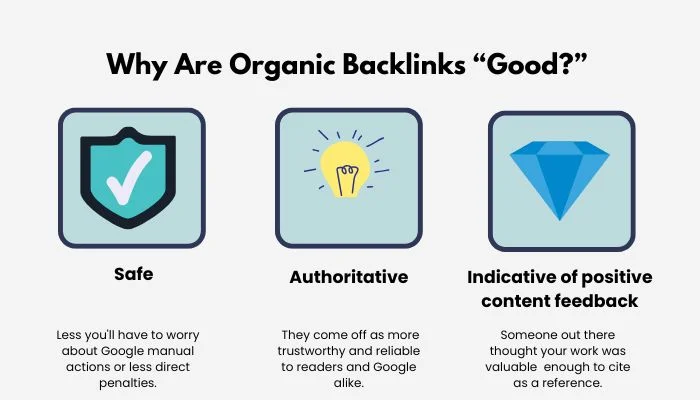What Is an "Organic" Backlink, Exactly?

You've heard that you need organic backlinks to support a search engine optimization (SEO) campaign.
You've heard about the merits of organic link building.
But what the heck is that even supposed to mean?
Are there non-organic backlinks?
Is it like organic fruit?
Do you really need organic backlinks to succeed in SEO?
First off, organic backlinks are not like organic fruits at all.
And in the course of this article, we’ll help you better understand exactly what organic backlinks are and aren't, and how to use them in your SEO strategy.
The Basics of Organic Backlinks
The easiest way to think of an organic backlink is as a natural backlink.
A back link, in case you aren't familiar, it's just a link pointing to your site from some other site. You need lots of backlinks of relatively high quality if you want to boost your website’s authority, which in turn, can increase your rankings in search engine results pages (SERPs).
The thing is, Google is extremely methodical in its approach to deterring spam. It has countless processes in place to find and devalue links that it suspects were built purely for the purpose of manipulating rankings or generating traffic.
A natural, or organic backlink, in contrast, is a link that occurs because of practical necessity or genuine interest.
For example, if I decide to write an article about monetary policy and I link to the website of the Federal Reserve to cite one of their statistics, the backlink I create is going to be an organic one. On the other hand, if the Federal Reserve pays me $100 to stick a link to their website in the middle of my totally unrelated article, that backlink would not be considered organic. In fact, it would probably be considered link spam.
These examples make the categories relatively clear, but not all use cases are so objective or easy to identify. In fact, it's tempting to say that most links occupy some kind of Gray area between these extremes.
More on that in a moment.
Why Are Organic Backlinks “Good?”
Why do we consider organic backlinks to be good for an SEO strategy?
Largely, it's because organic backlinks are:

- Safe. Bad backlinks can wreck an SEO strategy fast. Even a single backlink, if it's spammy or questionable enough, can undermine your authority and compromise the value of your SEO efforts. The more organic a backlink is, the safer it is, and the less you'll have to worry about Google manual actions or less direct penalties.
- Authoritative. Generally, organic backlinks are authoritative. They come off as more trustworthy and reliable to readers and Google alike, facilitating both higher organic rankings and higher volumes of referral traffic.
- Indicative of positive content feedback. Earning organic backlinks naturally is also an indication that your content is serving some kind of useful purpose. It means that someone out there thought your work was valuable or interesting enough to cite as a reference. And of course, if your content is good enough, your SEO strategy can almost run itself.
How to Naturally Earn Organic Backlinks
How do you naturally earn those organic backlinks?
In other words, how can you orchestrate it so that other authorities in your field actively want to link to your material?
- Develop the best content you can. You have to start with developing the best content you possibly can. Your content needs to be novel, interesting, practically valuable in some way, well written, and in-depth enough that other authorities are going to want to cite it. This isn't always easy to do, especially in today's crowded content marketing landscape. You can take some shortcuts here, such as conducting your own original research or offering a hot take on a popular subject, but you should deliberately avoid shortcuts that compromise the quality of your work, such as using AI to generate content en masse.
- Promote it. Promotion is a major part of content marketing, in part because even the best content can't sell itself. If you want people to read your material, link to your material, and celebrate your material, you first need to make them aware of your material. That means tapping into a variety of different marketing and advertising channels and generally working hard to make your content as visible as possible.
- Nurture relationships. It also helps for you to nurture relationships with other authorities in your space and publishers who might be interested in linking to your work. Editors and writers are much more likely to include a link referencing your material if you have a positive relationship with them already. Consider making more guest post contributions and stepping up your networking efforts to increase the likelihood of earning those organic links.
- Offer meaningful linking opportunities. You can also be a bit more proactive, offering meaningful linking opportunities wherever you see them. For example, if you notice a broken link on an authoritative site, you can offer a link to a similar piece on your own website as a substitute.
Even with these strategies, naturally earning backlinks is extremely hard and unreliable. It's much more common for businesses interested in SEO to take a more proactive, deliberate approach.
How to Build Organic Backlinks
Building organic backlinks is, in some respects, an oxymoron. Truly organic backlinks are ones that arise entirely naturally, so taking any intervening action to build one compromises that definition.
Typically, what we mean by “building organic backlinks” is taking deliberate measures to make sure the backlinks we build are natural, authoritative, and high in quality.
These are some of the best strategies to accomplish this:
- Follow all preceding strategies. First, it's important to pay attention to nearly all of the preceding strategies. Even if you're focused on building backlinks, rather than earning them naturally, you're still going to need excellent content on your website, you're still going to need to nurture relationships with publishers, and you're still going to need to hunt down and target excellent link building opportunities.
- Create content that’s easy to cite. Your content should also be relatively easy to cite. If your content offers specific facts, original research, or intriguing material that you can't find elsewhere, it's an excellent linking opportunity. This is especially true if you're covering a topic of significant public interest, or one that isn't frequently covered in your industry.
- Discover and research publishing opportunities. Do your research and due diligence to discover ideal publishing opportunities. Good publishing opportunities come from publishers who are in line with your industry, but also extremely authoritative; they also have relatively relaxed editorial standards, potentially allowing you to submit a guest post of your own. If you're not sure where to get started, look at some of the major publishers in your industry, as well as the backlink profiles of your closest competitors.
- Make relevant pitches to editors. Link outreach demands that you submit regular, relevant pitches to editors of these publishers. Make a suggestion of a post you could write and contribute to the blog, explaining why it would be relevant to their target audience and valuable for their readership. Unfortunately, most of your pitches are going to be rejected, but each of your pitches that gets approved is going to represent a new linking opportunity.
- Contribute excellent content. Are you noticing a pattern? When submitting guest posts to authoritative publishers, contribute the best content you can. Not only is this going to make your link more authoritative, more natural, and more valuable, but it's also going to strengthen and deepen your relationship with that publisher. As an added bonus, it's a nice way to build your company reputation and connect with the readers of this publication.
- Make sure your link is valuable in some way. Organic backlinks have a reason for their existence. They provide some kind of value, whether it's citing a specific fact, offering opportunities for further reading, or supplementing something important in the material. If your link checks one of these boxes, it's likely going to stand.
- Use natural language in your anchor text. It's tempting to stuff your anchor text with keywords and phrases that you're pursuing in your SEO strategy, but this isn't really a reliable tactic anymore. It's much safer to build your backlinks with natural language in your anchor text, relevantly connecting the link to the content.
- Include other relevant links. Finally, make sure you include plenty of other relevant links in your guest post submission. If you only have one link, and it's pointed to your home page, it's going to stick out like a sore thumb. If it's only one of several links that are all meaningful and capable of adding value to the piece, it's going to blend in more naturally and seem more organic to both readers and Google itself.
Earning vs. Building Organic Backlinks
So is it better to earn or build your organic backlinks?
Each approach has its merits.
Purely earning organic backlinks is extremely safe and allows you to maximize your public reputation, but it's also a bit unreliable and inconsistent.
On the other end of the spectrum, building organic backlinks is reliably effective and sustainable if you pursue the right strategies, but it's also a bit riskier.
That's why most successful companies in the SEO space try to practice a mix of both. Developing a strategy that allows you to both earn and build organic backlinks gives you a pathway to developing your reputation and climbing the ranking ladders the way you want.
Are you interested in getting started?
Everything starts with a free consultation – so contact us today!


.svg)

.jpg)
.jpg)
.jpg)